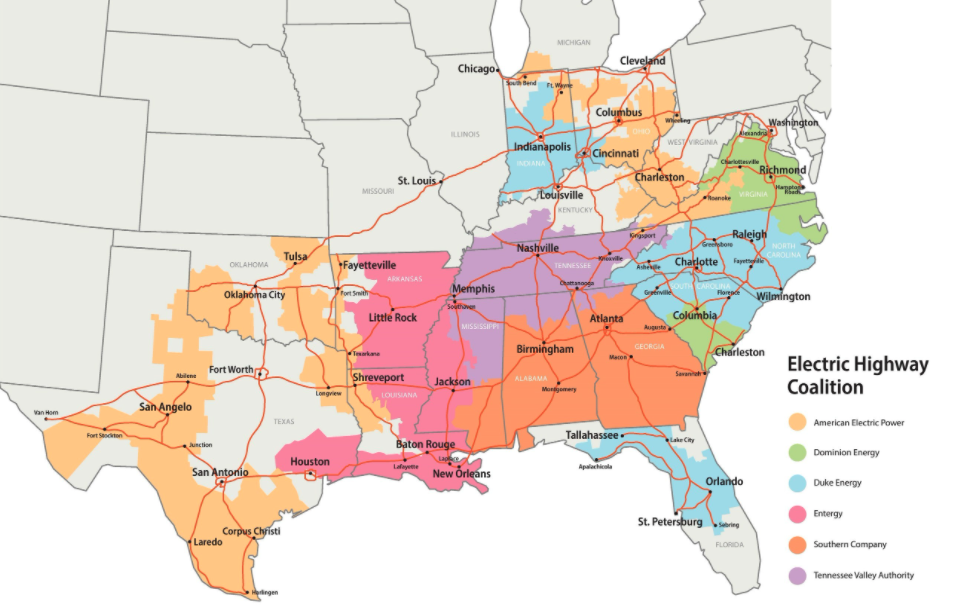New seamless charging network across18 states
Six major utility companies join together to add EV Fast Chargers to connect Gulf Coast, Midwest and Atlantic state destinations
=
The Electric Highway Coalition—made up of American Electric Power, Dominion Energy, Duke Energy, Entergy Corporation, Southern Company, and the Tennessee Valley Authority—announced a plan to enable EV drivers seamless travel across major regions of the country through a network of Direct Current (DC) fast chargers for electric vehicles (EVs). The companies are each taking steps to provide EV charging solutions within their service territories. This represents an unprecedented effort to offer convenient EV charging options across different company territories and allow EV travel without interruption.
The Edison Electric Institute estimates 18 million EVs will be on U.S. roads by 2030. While many drivers recognize the benefits of driving an EV, such as the ease of low-cost home charging, some are concerned with the availability of charging stations during long road trips. With efforts like the Electric Highway Coalition, electric companies are demonstrating to customers that EVs are a smart choice for driving around town, as well as traveling long distances.
This effort will provide drivers with effective, efficient, and convenient charging options that enable long-distance EV travel. Sites along major highway routes with easy highway access and amenities for travelers are being considered as coalition members work to determine final charging station locations. Charging stations will provide DC fast chargers that are capable of getting drivers back on the road in approximately 20-30 minutes.
"Dominion Energy is committed to equitable and reliable charging access so our customers may experience the benefits of electric transportation, including reduced carbon emissions," said Robert M. Blue, President and Chief Executive Officer at Dominion Energy. "We're excited to collaborate with our utility partners on this important initiative to connect customers to charging resources and encourage electric vehicle travel."
Dominion Energy is working to reduce carbon emissions and helping customers do the same. Transportation is the largest source of carbon emissions in the United States. Electrification plays a vital role in reducing emissions and improving air quality. The company is supporting the adoption of EVs in the following ways:
Providing rebates for electric vehicle charging. The Smart Charging Infrastructure Pilot Program supports EV adoption in Virginia and will inform the Eldesign of managed charging programs and other EV customer offerings in the future.
Helping public transportation go green. Electric transit buses in South Carolina and Virginia will be powered by Dominion Energy through partnerships with the Charleston Area Regional Transportation Authority (CARTA) and Hampton Roads Transit. Dominion Energy played an instrumental role in placing six electric buses in service in 2020 with CARTA, South Carolina's largest public transportation provider. The CARTA fleet of electric public buses is expected to grow to a total of 12 by the end of 2021, 32 by mid-2022, with eventual plans to convert the entire fleet of more than 120 buses to electric—all charging on Dominion Energy's grid.
Helping electric vehicle owners save money when they charge at off-peak times. Virginia customers who have smart meters will be eligible to enroll in a newly approved time-varying rate that will give them more control over their electric bill. The rate incentivizes customers to do certain tasks—such as charge their electric vehicle—at times of the day when demand for electricity is low.
Greening the company's fleet. Dominion Energy is reducing emissions from its light duty vehicle fleet by investing in electric and plug-in hybrid vehicles. Additionally, the company is installing electric vehicle charging at its office locations and has incentives for employees who want to purchase an electric vehicle.
Debuting an electric, self-driving shuttle that makes a loop between the Dunn Loring Metro Station and Mosaic District in Fairfax, Virginia. The project is the first state-funded test of autonomous public transportation in Virginia and is in partnership with Fairfax County.

